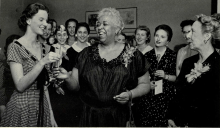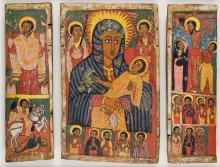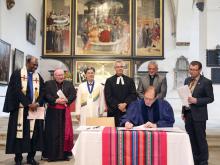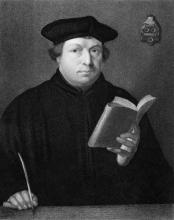protestantism

Whatever faults Black Protestantism has had, its grand strength is in its exercise of democratic debate internal to black Americans about the meaning of the good life and who gets a say in the shaping of that life, including perspectives from other faiths.

The idea that government has an important role to play in human flourishing was made by Pope Leo XIII in his 1891 encyclical Rerum Novarum. In it, the pope argued that governments should promote “the common good.” Catholicism defines the “common good” as the “conditions which allow people, either as groups or as individuals, to reach their fulfillment more fully and more easily.”

Luther esteemed the Church of Ethiopia because he thought Ethiopia, located far beyond the orbit of the Roman Catholic Church, was the first nation in history to convert to Christianity.

Amid ceremonies this year marking the 500th anniversary of the Reformation, one of Protestantism’s leading branches has officially said it now agrees with the Vatican on the main issue at the root of its split from the Roman Catholic Church half a millennium ago.

Oct. 31 is approaching quickly — a day marked throughout the United States by costume contests, pumpkin carvings, and children knocking on neighbors’ doors with questions of “trick or treat?”
But for Protestant churches around the world, Oct. 31 is also a celebration of a grown man knocking on a (rather large) door, asking a different question of the Catholic Church:
From whom does salvation truly come? And a follow-up: How do we refocus the church on the Gospel?
On this date, almost 500 years ago, Martin Luther hammered his 95 Theses onto the front doors of All Saints’ Church in Wittenberg, Germany — an act that, unforeseen by Luther at the time, is now credited with beginning the Protestant Reformation. Luther’s 95 Theses outlined his abstentions to the practice of selling indulgences to guarantee Christians salvation, emphasizing that grace is given by God alone and can only be assured by the clergy, not bought from them.
With the help of the social media of his day — the newly-improved printing press — news quickly spread to people throughout Europe that Martin Luther was questioning the papacy and attempting to refocus the church’s theology on forgiveness through the word and the eucharist, neither of which required financial prosperity. Within a few years, Martin Luther was excommunicated from the Catholic Church for his continued teachings, which included suggestions that the Bible should be accessible to all people and that priests not necessarily need to be celibate.
The Reformation gathered Christians from across Europe into a community of “rebels,” from which multiple denominations would spring up over the next half a century.
Today, 498 years later — with of a Catholic pope nicknamed “The Peoples’ Pope,” who is on Twitter and preaches about income inequality — what would Luther think of the state of the church?

We all know that when it comes to the acceptance of LGBT folks, religions differ. But what the religions communicate, and how the people in the pews actually feel, are not the same.
In a word, the rank and file tend to be more accepting than the leadership. What’s striking is how much this LGBT Gap varies from religion to religion, and we can get some idea of the variance from Pew’s new survey of LGBT Americans.
As the measure of institutional messaging, we will use the percentages of LGBT people who say a given religion is unfriendly to them. These range from 84, 83, 79, and 73 percent for Islam, Mormonism, Catholicism, and Evangelicalism to 47 and 44 percent for Judaism and Mainline Protestantism. Then there is the proportion of members of each religion who believe that “homosexuality should be discouraged by society.” That’s 45, 65, 20, and 59 percent for the first four groups; 15 and 26 percent for the last two.

DURHAM, N.C. — Protestants have traditionally celebrated Oct. 31 as the anniversary of the start of the Protestant Reformation, a movement that divided Western Christendom and gave birth to such diverse religious groups as Lutherans, Presbyterians, Anglicans, and Mennonites.
On Oct. 31, 1517, an Augustinian friar named Martin Luther nailed 95 theses for debate on the door of the Castle Church in Wittenberg, Germany, and so sparked a religious reform even he could not control.
But Luther's public life actually began five years earlier, 500 years ago this week, on Oct. 19, 1512, when he finished his formal theological education and was installed as a professor of Bible at a relatively new and still nonprestigious Catholic university in Saxony.
No one, least of all his patrons, expected this soft-spoken young man with a tenor voice and a bubbling sense of humor to turn into a religious bomb thrower, whose theological convictions would alter the religious and political structures of Europe for five centuries. Indeed, no one could have been more astonished by this unexpected development than Luther himself.
Lauren F. Winner reviews The Furnace of Affliction: Prison and Religion in Antebellum America, by Jennifer Graber. UNC Press.